#Marie Antoinette's son in law
Explore tagged Tumblr posts
Text
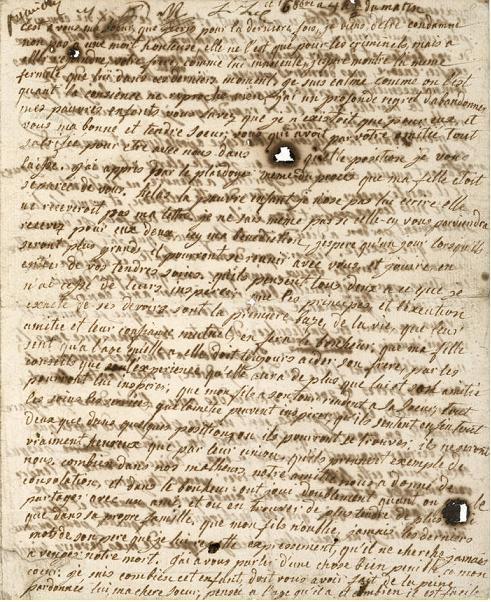
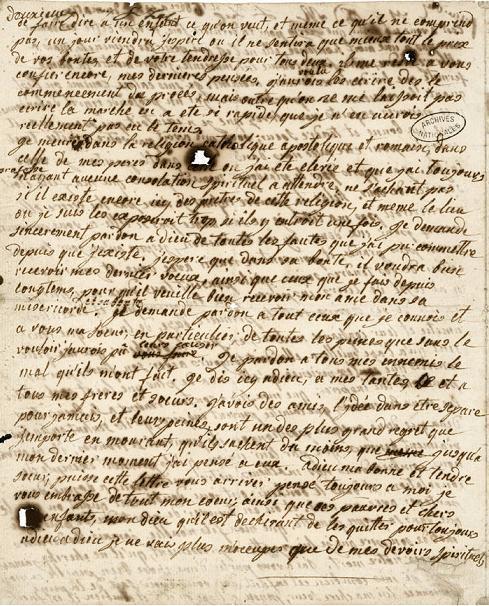
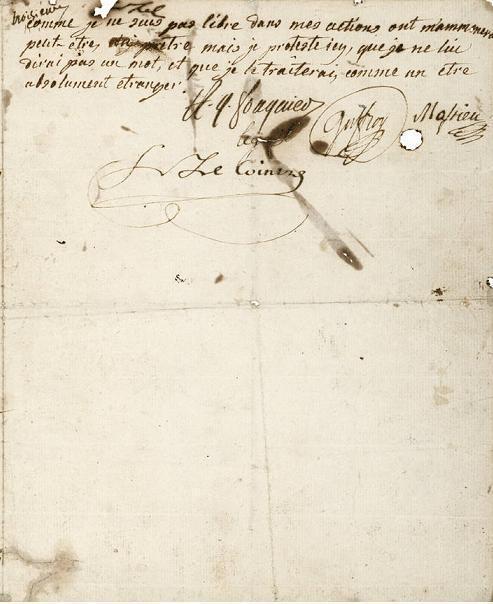
In the early morning hours of October 16th, having been condemned to death by guillotine, Marie Antoinette was led back to her cell in the Conciergerie. She wrote the following letter to her sister in law, Madame Elisabeth, but it would never reach her.
Here is a translation of the letter, images of the original are above.
16th October, 4.30 A.M. It is to you, my sister, that I write for the last time. I have just been condemned, not to a shameful death, for such is only for criminals, but to go and rejoin your brother. Innocent like him, I hope to show the same firmness in my last moments.
I am calm, as one is when one’s conscience reproaches one with nothing. I feel profound sorrow in leaving my poor children: you know that I only lived for them and for you, my good and tender sister. You who out of love have sacrificed everything to be with us, in what a position do I leave you! I have learned from the proceedings at my trial that my daughter was separated from you. Alas! poor child; I do not venture to write to her; she would not receive my letter. I do not even know whether this will reach you. Do you receive my blessing for both of them. I hope that one day when they are older they may be able to rejoin you, and to enjoy to the full your tender care. Let them both think of the lesson which I have never ceased to impress upon them, that the principles and the exact performance of their duties are the chief foundation of life; and then mutual affection and confidence in one another will constitute its happiness. Let my daughter feel that at her age she ought always to aid her brother by the advice which her greater experience and her affection may inspire her to give him. And let my son in his turn render to his sister all the care and all the services which affection can inspire. Let them, in short, both feel that, in whatever positions they may be placed, they will never be truly happy but through their union. Let them follow our example. In our own misfortunes how much comfort has our affection for one another afforded us! And, in times of happiness, we have enjoyed that doubly from being able to share it with a friend; and where can one find friends more tender and more united than in one’s own family? Let my son never forget the last words of his father, which I repeat emphatically; let him never seek to avenge our deaths. I have to speak to you of one thing which is very painful to my heart, I know how much pain the child must have caused you. Forgive him, my dear sister; think of his age, and how easy it is to make a child say whatever one wishes, especially when he does not understand it. It will come to pass one day, I hope, that he will better feel the value of your kindness and of your tender affection for both of them. It remains to confide to you my last thoughts. I should have wished to write them at the beginning of my trial; but, besides that they did not leave me any means of writing, events have passed so rapidly that I really have not had time. I die in the Catholic Apostolic and Roman religion, that of my fathers, that in which I was brought up, and which I have always professed. Having no spiritual consolation to look for, not even knowing whether there are still in this place any priests of that religion (and indeed the place where I am would expose them to too much danger if they were to enter it but once), I sincerely implore pardon of God for all the faults which I may have committed during my life. I trust that, in His goodness, He will mercifully accept my last prayers, as well as those which I have for a long time addressed to Him, to receive my soul into His mercy. I beg pardon of all whom I know, and especially of you, my sister, for all the vexations which, without intending it, I may have caused you. I pardon all my enemies the evils that they have done me. I bid farewell to my aunts and to all my brothers and sisters. I had friends. The idea of being forever separated from them and from all their troubles is one of the greatest sorrows that I suffer in dying. Let them at least know that to my latest moment I thought of them. Farewell, my good and tender sister. May this letter reach you. Think always of me; I embrace you with all my heart, as I do my poor dear children. My God, how heart-rending it is to leave them forever! Farewell! farewell! I must now occupy myself with my spiritual duties, as I am not free in my actions. Perhaps they will bring me a priest; but I here protest that I will not say a word to him, but that I will treat him as a total stranger.
#marie antoinette#madame elisabeth#marie therese charlotte#louis xvi#louix xvii#french revolution#18th century#long live the queue
55 notes
·
View notes
Note
Hi, I saw that the requests were closed, but I wanted to share with you one of my thoughts, maybe even an idea. This looks more like an AU, but let's imagine that Maleanor is alive and her son brings his partner to meet her. How do you think she would react to the fact that her son's partner is a human? Considering that she hates humans, it would hardly be a happy meeting, but for the sake of her son, I think she would try to find a compromise. Of course, on my part, this would be a romanticization of the character, but I would like to think that after some time, she will treat her son's partner like her own child.
I think more about the logistics of malleyuu than I'd care to admit. even without Maleanor in the picture, there are many influential nobles and senators(?) in Briar Valley who would surely be opposed to Malleus choosing a human
while fae/human relationships aren't "forbidden" or even that uncommon at this point in history from what we know about Sebek, this is the future king of Briar Valley we're talking about. I can't imagine that having a human queen/king/monarch etc after thousands of years of a pure fae lineage wouldn't be a problem. at least for some. it would cause considerable unrest amongst the older fae, and most of the senate would object to it. but Malleus is... Malleus. it's an unstoppable force meets an unmovable object, and would cause political unrest no matter what. even if Yuu is perfect, even if Lilia takes their side, even if Malleus throws a temper tantrum that kicks off overblot 2.0...
tradition in a place like Briar Valley is... kind of important. in canon it's stated over and over again that Briar Valley is extremely old-fashioned and traditional, to the point where basic technology isn't available to most of the population (can I assume that most don't have electricity or running water, too?). I wouldn't be surprised if there's some ancient laws preventing humans marrying into the royal bloodline that would have to be overturned just so malleyuu could happen
I'm sure not everyone would have a problem with it, like I said, fae/human marriages aren't a taboo (thank god), but there will be a lot of fae who would. not only is Yuu non-royal, a commoner, but also a human, and a human who can't perform magic. not only will Yuu die long, long before Malleus does, but there's a chance their children, if they're able to have them, won't inherit any magic (is this a problem? well, not to me, and not to malleyuu, but to the senate and people of Briar Valley, I cannot doubt it would be)
but like I said, Malleus is Malleus. he's like a toddler, stubborn and selfish, he loves his toys and doesn't want to share them. if he truly falls in love with Yuu, and they love him back, there's surely nothing anyone could do to prevent him from marrying them. I dare say he'd sooner step down as heir to the throne than to give them up. he'd at least threaten to
this is like, period-drama type civil unrest. marie antoinette type civil unrest. the political and social ramifications of malleyuu are the most interesting part of their dynamic to me tbh!
as for Maleanor? I love her. and she would 100% be against malleyuu for the listed reasons. unstoppable force vs immovable object, again. but she also loves her son, and I do think she would warm up to Yuu eventually, just... with that lingering sense of dread
27 notes
·
View notes
Text
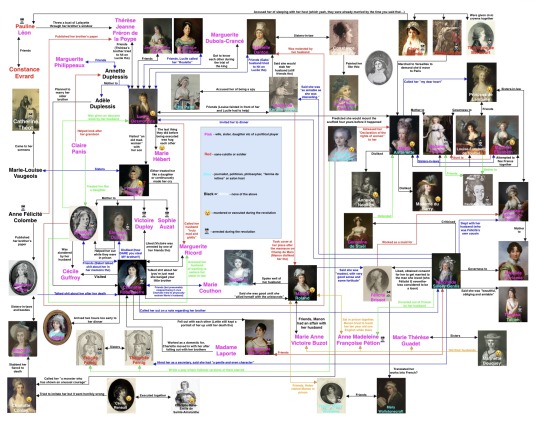
I decided to try this but for the girlies instead.
Are you sure want to click on ”keep reading”?
For Pauline Léon marrying Claire Lacombe’s host, see Liberty: the lives of six women in Revolutionary France (2006) by Lucy Moore, page 230
For Pauline Léon throwing a bust of Lafayette through Fréron’s window and being friends with Constance Evrard, see Pauline Léon, une républicaine révolutionnaire (2006) by Claude Guillon.
For Françoise Duplay’s sister visiting Catherine Théot, see Points de vue sur l’affaire Catherine Théot (1969) by Michel Eude, page 627.
For Anne Félicité Colombe publishing the papers of Marat and Fréron, see The women of Paris and their French Revolution (1998) by Dominique Godineau, page 382-383.
For the relationship between Simonne Evrard and Albertine Marat, see this post.
For Albertine Marat dissing Charlotte Robespierre, see F.V Raspail chez Albertine Marat (1911) by Albert Mathiez, page 663.
For Lucile Desmoulins predicting Marie-Antoinette would mount the scaffold, see the former’s diary from 1789.
For Lucile being friends with madame Boyer, Brune, Dubois-Crancé, Robert and Danton, calling madame Ricord’s husband ”brusque, coarse, truly mad, giddy, insane,” visiting ”an old madwoman” with madame Duplay’s son and being hit on by Danton as well as Louise Robert saying she would stab Danton, see Lucile’s diary 1792-1793.
For the relationship between Lucile Desmoulins and Marie Hébert, see this post.
For the relationship between Lucile Desmoulins and Thérèse Jeanne Fréron de la Poype, and the one between Annette Duplessis and Marguerite Philippeaux, see letters cited in Camille Desmoulins and his wife: passages from the history of the dantonists (1876) page 463-464 and 464-469.
For Adèle Duplessis having been engaged to Robespierre, see this letter from Annette Duplessis to Robespierre, seemingly written April 13 1794.
For Claire Panis helping look after Horace Desmoulins, see Panis précepteur d’Horace Desmoulins (1912) by Charles Valley.
For Élisabeth Lebas being slandered by Guffroy, molested by Danton, treated like a daughter by Claire Panis, accusing Ricord of seducing her sister-in-law and being helped out in prison by Éléonore, see Le conventionnel Le Bas : d'après des documents inédits et les mémoires de sa veuve, page 108, 125-126, 139 and 140-142.
For Élisabeth Lebas being given an obscene book by Desmoulins, see this post.
For Charlotte Robespierre dissing Joséphine, Éléonore Duplay, madame Genlis, Roland and Ricord, see Mémoires de Charlotte Robespierre sur ses deux frères (1834), page 76-77, 90-91, 96-97, 109-116 and 128-129.
For Charlotte Robespierre arriving two hours early to Rosalie Jullien’s dinner, see Journal d’une Bourgeoise pendant la Révolution 1791–1793, page 345.
For Charlotte Robespierre physically restraining Couthon, see this post.
For Charlotte Robespierre and Françoise Duplay’s relationship, see Mémoires de Charlotte Robespierre sur ses deux frères (1834) page 85-92 and Le conventional Le Bas: d’après des documents inédits et les mémoires de sa veuve (1902) page 104-105
For the relationship between Charlotte Robespierre and Victoire and Élisabeth Lebas, see this post.
For Charlotte Robespierre visiting madame Guffroy, moving in with madame Laporte and Victoire Duplay being arrested by one of Charlotte’s friends, see Charlotte Robespierre et ses amis (1961)
For Louise de Kéralio calling Etta Palm a spy, see Appel aux Françoises sur la régénération des mœurs et nécessité de l’influence des femmes dans un gouvernement libre (1791) by the latter.
For the relationship between Manon Roland and Louise de Kéralio Robert, see Mémoires de Madame Roland, volume 2, page 198-207
For the relationship between Madame Pétion and Manon Roland, see Mémoires de Madame Roland, volume 2, page 158 and 244-245 as well as Lettres de Madame Roland, volume 2, page 510.
For the relationship between Madame Roland and Madame Buzot, see Mémoires de Madame Roland (1793), volume 1, page 372, volume 2, page 167 as well as this letter from Manon to her husband dated September 9 1791. For the affair between Manon and Buzot, see this post.
For Manon Roland praising Condorcet, see Mémoires de Madame Roland, volume 2, page 14-15.
For the relationship between Manon Roland and Félicité Brissot, see Mémoires de Madame Roland, volume 1, page 360.
For the relationship between Helen Maria Williams and Manon Roland, see Memoirs of the Reign of Robespierre (1795), written by the former.
For the relationship between Mary Wollstonecraft and Helena Maria Williams, see Collected letters of Mary Wollstonecraft (1979), page 226.
For Constance Charpentier painting a portrait of Louise Sébastienne Danton, see Constance Charpentier: Peintre (1767-1849), page 74.
For Olympe de Gouges writing a play with fictional versions of the Fernig sisters, see L’Entrée de Dumourier à Bruxelles ou les Vivandiers (1793) page 94-97 and 105-110.
For Olympe de Gouges calling Charlotte Corday ”a monster who has shown an unusual courage,” see a letter from the former dated July 20 1793, cited on page 204 of Marie-Olympe de Gouges: une humaniste à la fin du XVIIIe siècle (2003) by Oliver Blanc.
For Olympe de Gouges adressing her declaration to Marie-Antoinette, see Les droits de la femme: à la reine (1791) written by the former.
For Germaine de Staël defending Marie-Antoinette, see Réflexions sur le procès de la Reine par une femme (1793) by the former.
For the friendship between Madame Royale and Pauline Tourzel, see Souvernirs de quarante ans: 1789-1830: récit d’une dame de Madame la Dauphine (1861) by the latter.
For Félicité Brissot possibly translating Mary Wollstonecraft, see Who translated into French and annotated Mary Wollstonecraft’s Vindication of the Rights of Woman? (2022) by Isabelle Bour.
For Félicité Brissot working as a maid for Louise Marie Adélaïde de Bourbon, see Mémoires inédites de Madame la comptesse de Genlis: sur le dix-huitième siècle et sur la révolution française, volume 4, page 106.
For Reine Audu, Claire Lacombe and Théroigne de Méricourt being given civic crowns together, see Gazette nationale ou le Moniteur universel, September 3, 1792.
For Reine Audu taking part in the women’s march on Versailles, see Reine Audu: les légendes des journées d’octobre (1917) by Marc de Villiers.
For Marie-Antoinette calling Lamballe ”my dear heart,” see Correspondance inédite de Marie Antoinette, page 197, 209 and 252.
For Marie-Antoinette disliking Madame du Barry, see https://plume-dhistoire.fr/marie-antoinette-contre-la-du-barry/
For Marie-Antoinette disliking Anne de Noailles, see Correspondance inédite de Marie Antoinette, page 30.
For Louise-Élisabeth Tourzel and Lamballe being friends, see Memoirs of the Duchess de Tourzel: Governess to the Children of France during the years 1789, 1790, 1791, 1792, 1793 and 1795 volume 2, page 257-258
For Félicité de Genlis being the mistress of Louise Marie Adélaïde de Bourbon’s husband, see La duchesse d’Orléans et Madame de Genlis (1913).
For Pétion escorting Madame Genlis out of France, see Mémoires inédites de Madame la comptesse de Genlis…, volume 4, page 99.
For the relationship between Félicité de Genlis and Louise de Kéralio Robert, see Mémoires de Madame de Genlis: en un volume, page 352-354
For the relationship between Félicité de Genlis and Germaine de Staël, see Mémoires inédits de Madame la comptesse de Genlis, volume 2, page 316-317
For the relationship between Félicité de Genlis and Théophile Fernig, see Mémoires inédits de Madame la comptesse de Genlis, volume 4, page 300-304
For the relationship between Félicité de Genlis and Félicité Brissot, see Mémoires inédites de Madame la comptesse de Genlis, volume 4, page 106-110, as well as this letter dated June 1783 from Félicité Brissot to Félicité Genlis.
For the relationship between Félicité de Genlis and Théresa Cabarrus, see Mémoires de Madame de Genlis: en un volume (1857) page 391.
For Félicité de Genlis inviting Lucile to dinner, see this letter from Sillery to Desmoulins dated March 3 1791.
For Marinette Bouquey hiding the husbands of madame Buzot, Pétion and Guadet, see Romances of the French Revolution (1909) by G. Lenotre, volume 2, page 304-323
Hey, don’t say I didn’t warn you!
#french revolution#frev#marie antoinette#pauline léon#claire lacombe#théroigne méricourt#reine audu#charlotte robespierre#éléonore duplay#élisabeth duplay#élisabeth lebas#lucile desmoulins#louise de kéralio#félicité de genlis#félicité brissot#mary wollstonecraft#manon roland#madame royale#charlotte corday#albertine marat#simonne evrard#catherine théot#madame élisabeth#sophie condorcet#françoise duplay#cécile renault#gabrielle danton#louise sebastien danton#theresa tallien#theresa cabarrus
195 notes
·
View notes
Note
Do we know what sort of relationship Junot had with his family, e.g. his parents? Did anyone try to support him during his mental decline at all?
There’s not a lot of information, but here’s what I know (I will refer to Junot as Andoche here to distinguish him from the other Junot family members):
Mother (Marie-Antoinette Junot): like most families of this era, the mother was closer to the children than the father was. Andoche absolutely adored his mother, and when he was governor of Paris she lived with him and Laure at their country home. Unfortunately she died from an illness in 1806, and Junot was heartbroken.
Father (Michel Junot): this one is a bit more of a complicated relationship. Andoche loved his father, but didn’t always agree with him. Michel wanted Andoche to be a lawyer but he quit law school to join the army, I can’t imagine that went down well. Michel was disappointed when Andoche and Laure’s first two children were girls (Napoleon expressed similar feelings too btw), although Andoche didn’t care much about the gender of his children. Overall they did love each other, but Andoche went down a very different path to the traditional bourgeois one that his father wanted him to follow. In 1813 Andoche was sent to live with Michel, however this was decided by the French authorities rather than the Junot family and understandably Michel was not equipped to look after his severely unwell son (who, by that point in time, was suffering from such bad brain damage and inflammation that he was mentally and physically disabled). I think Michel tried his best, but he was unable to prevent Andoche’s suicide.
Brother (Guy-Claude Junot): Guy-Claude and Andoche were very different characters who went very different routes in life and understandably were not that close. However Guy-Claude did come with Andoche to Egypt, and was with him in Montbard when he died.
Four older sisters: Two of the Junot sisters died as children, but the other two survived until adulthood and were also with Andoche in Montbard at the end of his life. Apart from that, very little is known about his relationships with his sisters.
(Btw it’s important to know that, apart from his mother moving to Paris, Andoche’s family stayed in Burgundy their whole lives. They were not there for him when he struggled because they physically lived in a different region of the country and did not see him.)
And outside of his biological family:
Laure: obviously their relationship is too complicated to talk about here, but regarding the end of Andoche’s life, Laure really tried her best to help. In early 1813 she obtained sick leave for him and put a lot of effort into looking after him at home and making him happy, but then he got sent to Illyria. She couldn’t go with him because she was pregnant (was the father Andoche or Laure’s lover Maurice? who tf knows), but when she got the news he was being sent home she was told he would pass through Geneva and went to meet him there. Unfortunately tragedy struck as Eugene de Beauharnais decided to send Andoche straight to Montbard without telling Laure, and then Laure had a traumatic miscarriage and was unable to travel to her husband. So Laure wasn’t there for him when he died, but she had tried her best to reunite with him, and her letters to Maurice about Andoche’s death are full of genuine heartbreak.
Brother-in-law (Albert de Permon): he was good friends with Andoche and, after the events discussed above, went to Montbard on Laure’s behalf to bear news of what had happened. He was with Andoche when he died.
Overall, Junot had a good relationship with his family and they tried their best to help him. But the issues he suffered from are hard to overcome in modern day, let alone in the 19th century. I think that, given how stigmatised mental illness was back then and how little people knew about it, his family did a decent job of trying to support him. I hope this answered your question!
18 notes
·
View notes
Note
I have a question! I’ve seen on here that Adrienne is apparently Lafayettes cousin? Is that true? I’ve been struggling to find a source for that…some help would be great! 😭❤️
Dear Anon,
That is a very interesting question; the short answer is no, the longer answer is probably. Allow me to elaborate:
Pedigree and one’s heritage was very important for the aristocracy of the 18th century in French. Part of the reason why La Fayette was considered as such a good match for Adrienne was his family name. If we have a look at this family tree, we see that Adrienne and La Fayette were not directly related, they were not first cousins.

La Fayette’s mother was an only child (I believe her father was as well?) and his father had two sisters, one never married and the other one married, had a daughter and was widowed young. That daughter and La Fayette had a very close relationship, and she was like a sister to him. She died in childbed while he served in America, and he deeply regretted not being able to see her again before her death.
That was the short answer, as to the longer answer; cousins are not all created equal. While we established that Adrienne and La Fayette were not first cousins, they could still be cousins of a different degree. The books and research I have read so far are not particular detailed when it comes to the extended family on both sides and I have never done too much research on my own into the ancestry of the de Noailles family – I am with John Adams on this point, the family tree of the de Noailles is just too convoluted and too interconnected.
But here is where it gets tricky. La Fayette was most likely a cousin to his father-in-law (in some shape or form). In her book, Laura Auricchio calls La Fayette the duc d’Ayens “cousin-turned-son-in-law”.
The Duc d’Ayen also had a cousin (the oldest son of his father’s younger brother), Louis Marie de Noailles, Vicomte de Noailles. Louis was also a cousin of La Fayette’s (again, please do not ask me how exactly they were related). But more so, he was also La Fayette’s brother-in-law for Louis married Louise, the older sister of La Fayette wife Adrienne.

Now, to top it all off, Louis and La Fayette both had a close friend, Louis-Phillipe, comte de Ségur. He married Antoinette Élisabeth d'Aguesseau. Antoinette was the younger sister of Adrienne’s and Louise’s mother – Ségur was therefore technically his two best friends’ uncle by marriage.

As you can see, there is a lot going on and there certainly was some sort of familial connection between the de La Fayette’s and the de Noailles’, but it was not a very close one for all that I know (and I am quite firm in the families history for three to four generations). But chances are high that I will take a deep dive into the French archives next year and might look more detailed into the de Noailles family.
Until such time, (or until someone else has more information about the topic) I hope this answer could clear some things up and that you have/had a wonderful day!
#ask me anything#anon#marquis de lafayette#la fayette#lafayette#adrienne de lafayette#adrienne de noailles#french history#american history#history#louis marie de noailles#louis phillipe comte de ségur
17 notes
·
View notes
Text
Pierre Gaspard Chaumette

Chaumette is, in my eyes, one of the most complex revolutionaries of this period. He is very interesting, but at times I wanted to applaud him and shake his hand, and at other times I wanted to booed him or even punch him in the face. It's really strange, and this feeling lasted until the end. Frankly, the mix of admiration and exasperation (an understatement for the two feelings mentioned) he inspires in me is disconcerting even to myself.
In a way, he embodies one of the most generous aspects of the revolution and, at the same time, one of the most conservative, even reactionary, aspects, sometimes verging on the lamentable. He is truly a paradoxical character, much more so than other revolutionaries. That’s why, in my eyes, he is one of the most fascinating figures of the French Revolution to study.
Positive Aspects:
He went much further in the fight against slavery than others (notably compared to Olympe de Gouges); for example, he supported the Haitian revolts with great enthusiasm. One could say he was an anti-colonialist, which demonstrates that he firmly believed not only in the freedom of metropolitan France but also in the freedom of other peoples (perhaps this idea took root when he was a naval officer in the American War of Independence, but we know his fight against slavery was due to his stay in the West Indies).
Like other revolutionaries, he was against the issue of war, a decision that proved to be the right one.
He sought to emancipate the French people from religious aspects that infantilized them.
Contrary to the black legend, he did not participate in the September massacres.
Let’s not forget that he lived with other revolutionaries in a very complicated and infernal period, aggravated by a war he did not want and fight. Plus the royalists threats were not empty words
He fulfilled his role as the prosecutor of the Paris Commune with great care. He championed the principle of providing individual beds in hospitals, for example, and the equality of funeral rites for both the rich and the poor. He advocated for the maximum and only intervened in the Convention with the sections of the sans-culottes when he deemed it necessary for measures that proved to be good, such as the maximum and the raising of a revolutionary army. He fought against poverty. He did not use armed force to throw deputies out and get elected (at the same time, the sans-culottes would have dismantled him if he had tried, and he wouldn’t have succeeded). As for the Girondins (the 21 placed under arrest), let’s not forget they were responsible for a war that Chaumette and many others did not want, which worsened the revolution’s situation, and moreover, the Gironde wanted their heads and other deputies had gravely disrespected them (an understatement when we consider Isnard's speech). I feel that Chaumette did not want power; he was part of that group of revolutionaries who would oversee the government to ensure it responded to the people's needs and would only intervene if he deemed it necessary, which is ultimately a good thing. Moreover, he was pragmatic and more reasonable than others; he refused to rise alongside other Hébertists for an insurrection against the Montagnards (some argue he was satisfied with the Convention's compensation on the Ventôse law, ultimately not applied, and knew the Convention was in a tough situation and it was better not to push). Ultimately, his execution was a grave mistake. One could say he was a man who lived for the revolution until the end and died with disinterest.
Negative Aspects:
The gross opportunism he displayed, along with others, to eliminate the Enragés and resume his petitions. Just a big no for me.
Apparently, but this needs proof, so maybe what I'm saying is false, he was complicit with Hébert (alongside Pache and Jacques-Louis David) in the disgusting false accusation concerning Marie Antoinette and her son (so horrible I won't repeat it). He should have died of shame for even thinking of doing that.
His great misogyny, which is appalling, even worse than other revolutionaries who refused to grant more rights to women's citizenship. Just reading his speeches makes you facepalm and want to hit him. And apparently, it was worse for prostitutes.
When he invaded with Hanriot and the sans-culottes to demand the arrest of the Girondins, they made a grave violation of the law, regardless of whether they had good reasons or not.
It’s true he supported the harshest laws, no matter how understandable his frustration was with many others, you don't "play" (forgive the expression) with judicial safeguards. He let Hébert, his deputy, unleash demands for executions, including those of innocents (General Custine among many others). So in the best case he is responsible and in worst case he encourage or maybe give him orders as Hebert was less senior as he didn't have the same rank in Commune than him although Hebert acted freely.Plus somewhere it allowed madmen like Carrier, Barras, Fouché (although more out of opportunism than a fervent revolutionary, especially when we know Fouché well) to try to exonerate themselves from the horrible acts they committed while trying to rely on the unusual harshness of certain aspects of the revolution.
The imposition of dechristianisation of people that didn't want that. Can't answer intolerance by other intolerance . Yes secularism is very important but cannot prevent people from following a religion. Plus it exasperated a lot of French people at that time bad move ( already talk in one my post of this https://www.tumblr.com/nesiacha/744960791081631744/the-difference-in-treatment-between-the-indulgents?source=share)
It's interesting to see that by lowering "the safeguards" and legal security, the revolutionaries programmed their own disappearance in a way (I simplify because it's more complicated than that they were not bloodthirst and there is too much black legend on them). I know wartime laws cannot be the same as peacetime laws, but one must be very careful even if there was an infernal situation. And if Chaumette’s execution can rightly be judged as unjustified, he, in a way, also programmed his own disappearance with others. But whatever happens when we analyze all the aspects of the frev we can only be admiring but also disappointed in the missed appointments of this period which could have been magnificent. And that’s really what comes out of Chaumette
27 notes
·
View notes
Text

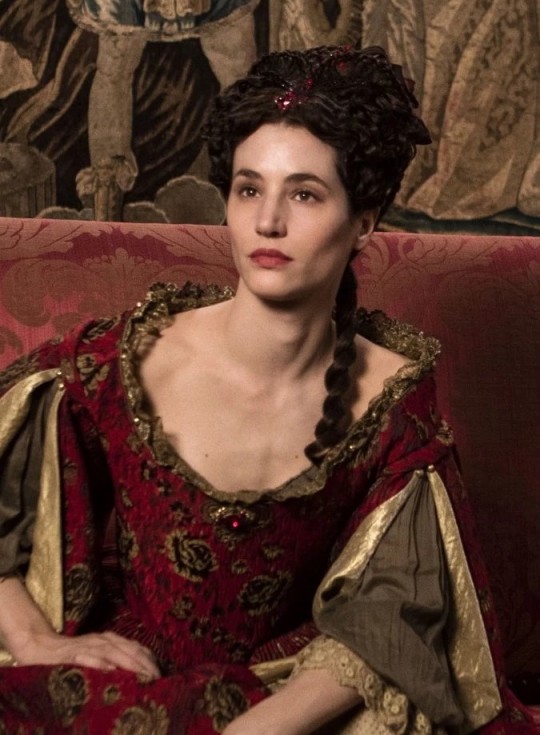


Marie Antoinette in The Chevalier: While there is no shortage of bad portrayals of Marie Antoinette, this one is particularly confusing. The movie seems to imply that she is at fault for *checks notes* not solving France's racism problems (the movie does not acknowledge how much she was a target of French sexism and xenophobia.) It seemingly faults her for choosing her family's safety over a friendship that is maybe an emotional affair. It also introduces Mozart as an entitled dickhead in the first scene for some reason.
Marie-Theresa of Spain in Versailles: While this show certainly does some things well (the costumes are wonderful, Liselotte, Princess Palatine gets a reasonably good portrayal), it fumbles Marie-Theresa rather badly. She is introduced giving birth to a black baby fathered by a court dwarf (yes really.) She spends the rest of the series being swarthy, judgemental, and strictly religious, because that's just what Spaniards do in period dramas.
Archduchess Sophie in Die Kaiserin: Technically she is a Wittelsbach, but given that this show seems convinced that she was puppeteering the whole Habsburg state after 1848, it feels like it deserves inclusion on this list. While giving Franz Joseph no personal agency is not exactly a new take, nor is making Sophie an evil mother-in-law, this show ramps it up, invents affairs, makes Franz Joseph a bastard, and implies some very strange psychosexual stuff with her and her sons.
Maria Theresa, Archduchess of Austria in Maria Theresa: If you, like me, were excited to actually get a show about the most iconic female ruler in Central European history, you were also disappointed. Do you enjoy the insistence in Sisi media that she had an affair with Andrassy? No? Well, too bad, we are doing it again with Esterhazy and Maria Theresa. They can't possibly portray a strong woman without making her marriage garbage and showing affairs that didn't historically happen. (I also will not shut up about how bad that wig is)
These are the admins opinions and you're free to disagree
31 notes
·
View notes
Text
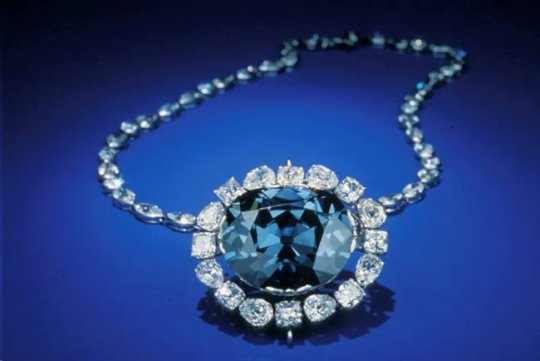
"Blue Hope" = Hope Diamond
Maybe people already knew this, but I just noticed that it seems the "Blue Hope" is based on the (blue) Hope Diamond, which was also owned by the real Marie Antoinette and is also "cursed" like the Blue Hope is said to be, as almost every owner has faced bad luck or misfortune.
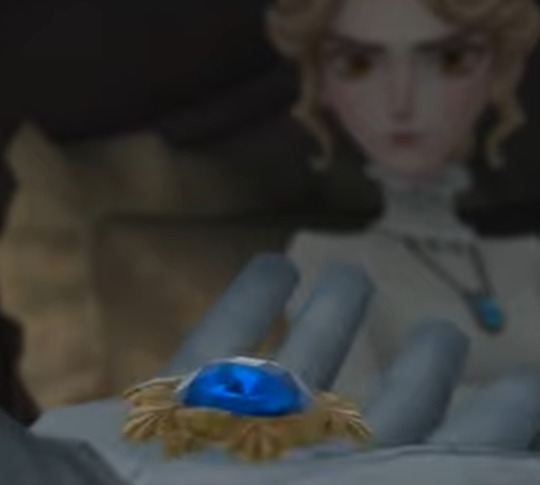


The curse starts with Jean-Baptiste Tavernier, who supposedly stole the gem. He dies to a bad fever.
He sold the gem to Louis XIV, who died of gangrene. Nicholas Fouquet, who worked for him and was said to have worn it, soon falls out of favor, banished, and imprisoned for life.
We all know what happened to Marie Antoinette and her husband. Marie's friend, Princess Lamballe, also briefly wore the gem and died soon after.
It was stolen during the French revolution, and later cut by Wilhelm Fals. His son stole it, killed his dad, then killed himself.
The gem disappeared for some time but was found in a collection with the Hope London banking family.
Simon Maoncharides, who drove his car off a cliff, sold the gem to Pierre Cartier, who sold it to Evalyn Walsh McClean.
Evalyns mother-in-law died, while her son died at age 9, her husband left her for another woman then later died in a mental hospital, her daughter died of drug overdose, and she was forced to sell her newspaper due to huge debts, which is how she died.
The gem was donated to the Smithsonian Institution. The mailman who delivered the gem was involved in a truck accident, suffered a head injury in a separate accident, and his house burned down.
#idv#identity v#mary kreiburg#mary de capet#frederick kreiburg#composer#idv frederick#identity v frederick#idv composer#identity v composer#ashes of memory#sirenjose analyses and theories
52 notes
·
View notes
Text

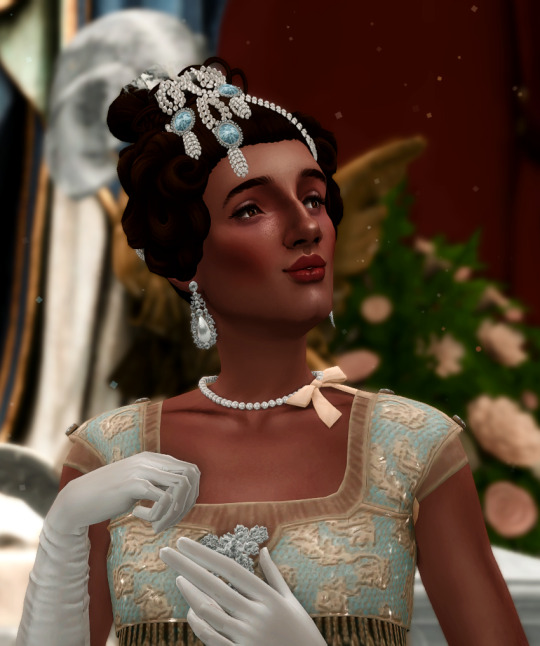
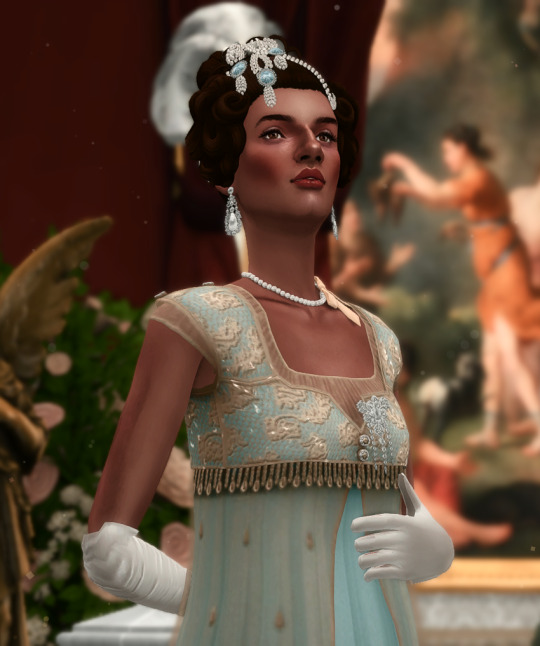
Princess Adelheid, Margravine [Redacted]
Born Countess Adelheid Elisabet Amalia of Celle and March; 8 May 1805 - 24 September 188x, Adelheid was the youngest child of Countess Wilhelmine of Celle and Count Bernard of March. Her elder siblings were Everette I, Grand Duke of Bergstrasse and Countess Marie-Odile of March. Adelheid was born at Schloss Celle, and christened into the Catholic faith. She was raised in the French court after the premature deaths of her parents during the Napoléonic Wars, by her elder brother. In 181x, she was arranged to marry Prince Jean, Margrave [Redacted] in what was a significant military alliance between the two families. They were married in the spring of 182x. She gave birth to nine children, only three of which survived to adulthood: Princes Stefan and Luitpold, and Princess Rudolphine. Her betrothment and marriage was a significant step up in the social climbing of her brother, Everette I, who was able to massively expand the Rodchester-Bach's wealth and prominence during the reign of Emperor Napoléon I Simparte. Adelheid never remarried after the early demise of her husband, nor did she return home to Bergstrasse. Instead, she remained in the court of her son, Prince Stefan, until her death in September of 188x. Throughout her life, she remained in close companionship with her sister-in-law, Princess Antoinette. Letters from Adelheid to her personal staff reveal that she and her Chief Lady-in-Waiting, Helene von Voss, carried on a short lived affair in the 1840s. Adelheid's original diaries and personal letters were destroyed, and/or heavily edited, by her daughter posthumously. Recordings of her life rely, mainly, upon the writings and accounts of her husband, brother, and children.
@simming-in-the-rain and @empiredesimparte for mention :)
#royal simblr#queer sims#ts4 story#sims 4 screenshots#ts4 storytelling#sims story#s4 story#ts4 royalty#simblr#sims 4#rodchester-extras#worldbuilding#lol I forgot to queue
60 notes
·
View notes
Text
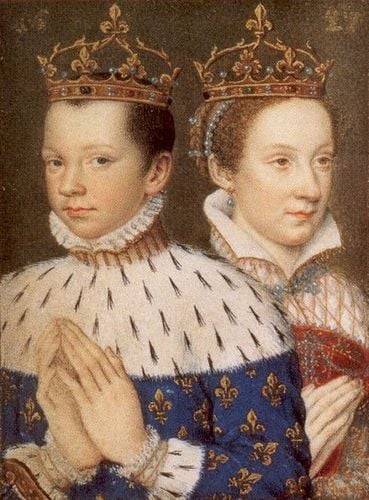
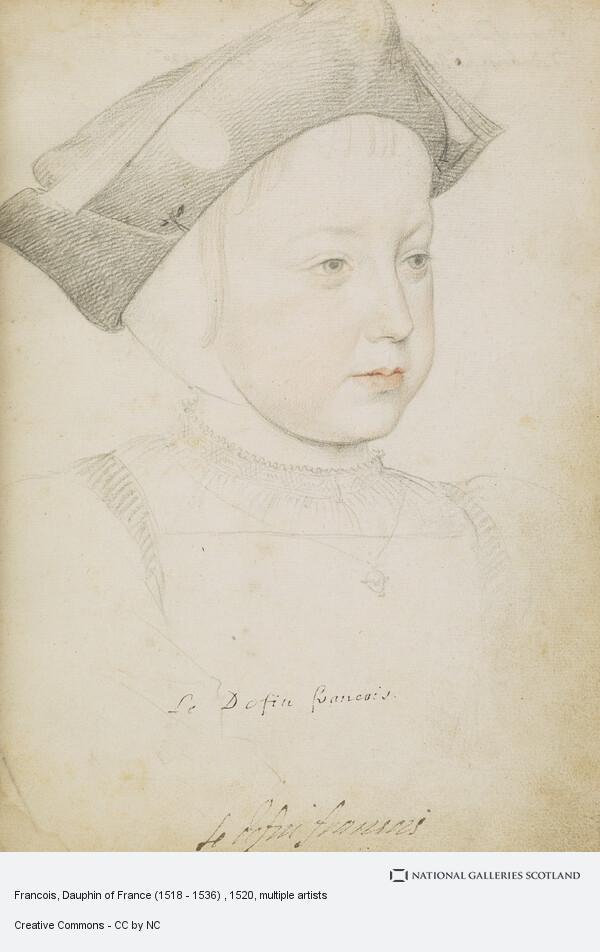
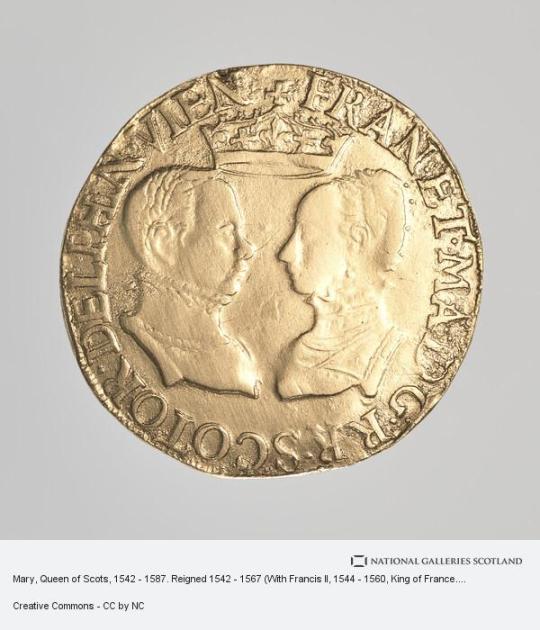
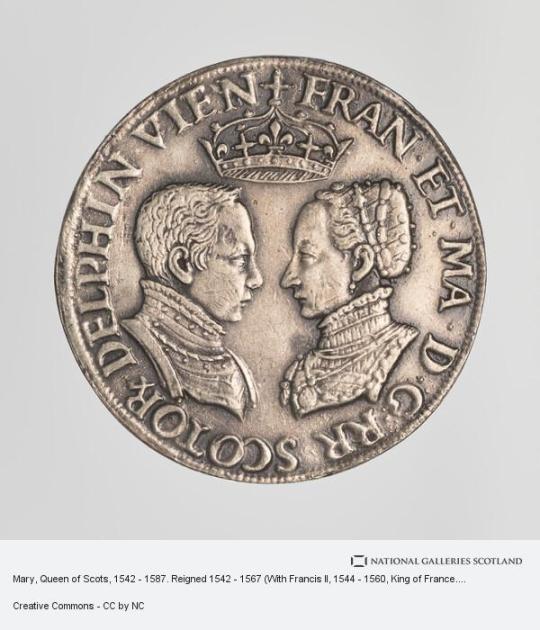
On December 5th 1560 King Francis II of France, the husband of Mary Queen of Scots, died.
Although not crowned it has to be remembered that Francis was also King consort of Scotland.
Francis was born on 19 January 1544, the eldest son of Henry II of France and Catherine de Medici, he was named for his grandfather, King Francis I.
When Francis was four years old, the Scots and French signed the Treaty of Haddington in July 1548 arranging the betrothal of Mary Queen of Scots and the dauphin Francis in return for French aid to expel the invading English. Mary Queen of Scots sailed from Dumbarton for France in the August of 1548 when she was but five years old. The young Queen was accompanied by her four Marys, the daughters of Scottish noble families, Mary Beaton, Mary Seton, Mary Fleming and Mary Livingston.
Mary spent the rest of her childhood at the court of her father-in-law, Henri II Her father-in-law, Henry II of France wrote 'from the very first day they met, my son and she got on as well together as if they had known each other for a long time'. Mary was a pretty child and brought up in the same nursery as her future husband and his siblings, became very attached to him. She corresponded regularly Mary of Guise , who remained in Scotland to rule as regent for her daughter. Much of her early life was spent at Château de Chambord. She was educated at the French court learning French, Latin, Greek, Spanish and Italian and enjoyed falconry, needlework, poetry, prose, horse riding and playing musical instruments.
Mary was the cosseted darling of the French court, the doting Henri II wrote 'The little Queen of Scots is the most perfect child I have ever seen.' He corresponded frequently with Mary of Guise, expressing his delight in his young daughter-in-law. Mary's maternal grandmother, Antoinette of Guise, in a letter to her daughter in Scotland, stated that she found Mary ' very pretty, graceful and self assured.'
Francis and Mary were married with spectacular pageantry and magnificence in the cathedral of Notre Dame, Paris, by the Cardinal Archbishop of Rouen, in the presence of Henry II, Queen Catherine de' Medici and a glittering throng of cardinals and nobles. The French courtier Pierre de Brantôme described Mary as ‘a hundred times more beautiful than a goddess of heaven … her person alone was worth a kingdom.’
Among the wedding guests was one, James Hepburn Earl of Bothwell. Francis was fourteen and Mary fifteen at the time, Francis then held the title King consort of Scotland until his death.
When Henri II was killed during a jousting contest, incidentally by Gabriel de Lorges, Comte de Montgomery, Captain of The Scots Guard, and a descendant of Alexander Montgomerie of Auchterhouse, Mary's young husband Francois ascended the throne. Francis was reported to have found the crown of France so heavy that the nobles were obliged to hold it in place for him.
The young Francis became a tool of Mary's maternal relations, the ambitious Guise family, who seized the chance for power and hoped to crush the Huguenots in France. The Huguenot leader, Louis de Bourbon, prince de Condé plotted the conspiracy of Amboise in March 1560, an abortive coup d'etat in which Huguenots surrounded the Château of Amboise and attempted to seize the King. The conspiracy was savagely put down, and its failure led to increase the power of the Guises. This alarmed the king 's mother, Catherine de Medici, who reacted by attempting to secure the appointment of the moderate Michel de L'Hospital as chancellor.
During the autumn of 1560 François became increasingly ill, and died from the complications of an ear condition, in Orléans, Loiret. Since the marriage had borne no children, the French throne passed to his 10-year-old brother, Charles IX. Mary was said to be grief-stricken Multiple diseases have been suggested as the cause of Francis' death, such as mastoiditis, meningitis, or otitis exacerbated into an abscess. Francis was buried in the Basilica of St Denis.
There was no place for the seventeen year old Mary, Queen of Scots in France, she prepared to return to her native Scotland with an uncertain future that would hold.
17 notes
·
View notes
Text


My own silly little interpretation of Edward Rochester if he were my OC instead of Charlotte Brontë’s ( Jane Eyre Chainsaw Man AU, takes place in the 2000’s)
Edward Fairfax Rochester
Born: 10/11/1976, 26 years old
Gender: male, he/him
Family: Frederick and Rowland Rochester ( father and brother), Ahed Al-Wadood ( mother, deceased), Mary-Anne Fairfax Rochester ( stepmother/half mother , deceased)
Occupation: Devil Hunter, current captain of division 6. Later landlord to Thornfield Hall.
Devil contracts: Tragedy, Terror, and The Electricity Fiend
Edward was raised for most of his life by his mother, an independent journalist who often worked for large media companies in a series of contracts back in Britain. Most of the time she would have to work in her home country, whatever the news decided to call it, she called it Palestine. Edward would spend half a year with his mother and half a year with his father and his wife. In order to keep up the charade that he was his father’s legitimate son.
So he grew up knowing what war and violence looked like. Sometimes following his mother to visit family in Gaza or Jerusalem. He knew what it was like to have threats issued that your house was going to be demolished, or to be randomly searched at checkpoints when you wanted to go one place to another. He knew what stark contrast it was to the luxurious life he lived in Britain with his father. But one incident would change his boy mind forever.
His mother was shot during crossfire between the two sides. And though the killer was obvious and clearly on the side of the occupation, no one bothered to bring him to justice. Edward was never the same after the death of his mother. He would spend his whole year in the UK from there on out. But the images of violence and bloodshed caused by human hands would not escape his mind. Soon he would learn that it was not only humans that could cause that sort of destruction.
Being the sheltered son of a billionaire he was in the UK, he did not know much about Devils or Fiends and what they could do to humans if you ever got near. After all, public safety and the Devil Hunters could take care of them, right?
It was not until he witnessed a Devil maul a civilian before his very eyes as a teenager that they felt real. As real as soldiers in uniforms. And for the first time since his mothers death, he felt like he could do something about it. These devils weren’t humans, you could bring them to justice no questions asked. Hungry to take out his revenge on targets that deserved it, he started training and soon enough joined the Public Safety Devil Hunters in London.
And there he met the Devil Killer herself, Antoinette Bertha Mason.
They say the best devil hunters are those that have the most screws loose. And if it was true, then Antoinette was the best of the best. The two of them became work buddies, and the worked together most of the time. Bertha always remaining at arms length from Edward due to her insanity. But saving his life more than a few times during their escapades. A strange sort of one sided friendship grew between them.
Then Antoinette nearly died, and was possessed by a devil.
The electricity Devil, effectively making whatever Antoinette was a fiend. By law, meant to be killed as mercilessly as any devil. But Edward, not bearing to kill his friend and colleague, or what was his friend and colleague, hid her in the attic of Thornfield hall and took it upon himself to take care of her.
And that’s his backstory lmao ahaha
#jane eyre#edward rochester#mr rochester#Chainsaw man#chainsaw man fanart#chainsaw man oc#jane eyre au
19 notes
·
View notes
Text
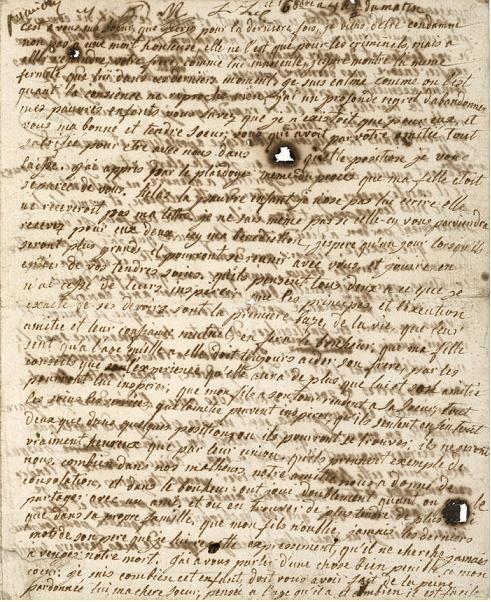


In the early morning hours of October 16th, having been condemned to death by guillotine, Marie Antoinette was led back to her cell in the Conciergerie. She wrote the following letter to her sister in law, Madame Elisabeth, but it would never reach her.
Here is a translation of the letter, images of the original are above.
16th October, 4.30 A.M. It is to you, my sister, that I write for the last time. I have just been condemned, not to a shameful death, for such is only for criminals, but to go and rejoin your brother. Innocent like him, I hope to show the same firmness in my last moments.
I am calm, as one is when one's conscience reproaches one with nothing. I feel profound sorrow in leaving my poor children: you know that I only lived for them and for you, my good and tender sister. You who out of love have sacrificed everything to be with us, in what a position do I leave you! I have learned from the proceedings at my trial that my daughter was separated from you. Alas! poor child; I do not venture to write to her; she would not receive my letter. I do not even know whether this will reach you. Do you receive my blessing for both of them. I hope that one day when they are older they may be able to rejoin you, and to enjoy to the full your tender care. Let them both think of the lesson which I have never ceased to impress upon them, that the principles and the exact performance of their duties are the chief foundation of life; and then mutual affection and confidence in one another will constitute its happiness. Let my daughter feel that at her age she ought always to aid her brother by the advice which her greater experience and her affection may inspire her to give him. And let my son in his turn render to his sister all the care and all the services which affection can inspire. Let them, in short, both feel that, in whatever positions they may be placed, they will never be truly happy but through their union. Let them follow our example. In our own misfortunes how much comfort has our affection for one another afforded us! And, in times of happiness, we have enjoyed that doubly from being able to share it with a friend; and where can one find friends more tender and more united than in one's own family? Let my son never forget the last words of his father, which I repeat emphatically; let him never seek to avenge our deaths. I have to speak to you of one thing which is very painful to my heart, I know how much pain the child must have caused you. Forgive him, my dear sister; think of his age, and how easy it is to make a child say whatever one wishes, especially when he does not understand it. It will come to pass one day, I hope, that he will better feel the value of your kindness and of your tender affection for both of them. It remains to confide to you my last thoughts. I should have wished to write them at the beginning of my trial; but, besides that they did not leave me any means of writing, events have passed so rapidly that I really have not had time. I die in the Catholic Apostolic and Roman religion, that of my fathers, that in which I was brought up, and which I have always professed. Having no spiritual consolation to look for, not even knowing whether there are still in this place any priests of that religion (and indeed the place where I am would expose them to too much danger if they were to enter it but once), I sincerely implore pardon of God for all the faults which I may have committed during my life. I trust that, in His goodness, He will mercifully accept my last prayers, as well as those which I have for a long time addressed to Him, to receive my soul into His mercy. I beg pardon of all whom I know, and especially of you, my sister, for all the vexations which, without intending it, I may have caused you. I pardon all my enemies the evils that they have done me. I bid farewell to my aunts and to all my brothers and sisters. I had friends. The idea of being forever separated from them and from all their troubles is one of the greatest sorrows that I suffer in dying. Let them at least know that to my latest moment I thought of them. Farewell, my good and tender sister. May this letter reach you. Think always of me; I embrace you with all my heart, as I do my poor dear children. My God, how heart-rending it is to leave them forever! Farewell! farewell! I must now occupy myself with my spiritual duties, as I am not free in my actions. Perhaps they will bring me a priest; but I here protest that I will not say a word to him, but that I will treat him as a total stranger.
22 notes
·
View notes
Text
Genshin Impact - To the Stars Shining in the Depths Act III and Act IV Commentary (full spoilers)
-Finding a quiet place to read a book?! Not me relating to Paimon?!
-I love the Furina-Neuvillette interactions.
-FATHER IS HERE! FATHER ARLECCHINO IS HERE, THIS IS NOT A DRILL!
-Oh, the House of Hearth is in Fontaine? I wasn’t sure.
-”A personal relationship with the administrator” - NEUVILLETTE, WHAT! Hoyo, why you feeding us the good Wrio/Neuvi content like that
-No, I don’t want that cake, the Knave brought that cake, what are you up to, Monsieur Neuvillette?
-I also think spoilers are despicable, thank you Charlotte (*and I’m just realizing post-quests that in the end we never catch up with Charlotte??)
-I see. We are guilty of eating the cake. Neuvi, you little snek.
-Did Childe get teleported in the Abyss or something
-Wriothesleyyyy! Is he cat-oriented? Dog-oriented?
-Why is our baby Lyney in prison! Oh, he should be Arlecchino’s spy, yeah? We’re disrupting Wriothesley’s business so bad
-What Neuvillette and Wriothesley have to discuss is not for your ears, Paimon. Let them be.
-The rizz of Lyney to leave us a card, jeez.
-The two spies from the two sides, we really are star-crossed lovers, aren’t we, Lyney
-Oh, Lyney actually goes out of his way to tell us everything, good boy. Or he might be manipulating us, but you know what, eff it, I choose to trust Lyney and take him at face value.
-Lyney, your crush is showing.
-Sigewinne’s lil shoes tho.
-Childe, I love you, but investigating you is taking too long and I’m not interacting with any main characters and I’m starting to grumble
-Is Alexis’ VA Diluc’s VA…? They sound so similar (JP dub).
-How long has Childe been in prison???
-Lyney really said “We will not take advantage of my crush. Lynette! To the infirmary!”
-We are the Romeo and Juliet of Genshin, Lyney. Deny thy Father, Lyney.
-Traumatic flashbacks Lyney?? “This is not like what happened last time, the situation is different now”??? He is SUFFERING, omg LYNEY
-”A parents’ evening” hahaha
-Us to Siggie: “If you’re close with Neuvillette, why not learn a thing or two about virtue from him?” Wow, we’re going all out on protecting and standing up for the Lyney siblings, huh. Look at us go.
-FREMINET CONSUMED PRIMORDIAL SEAWATER??? HELP!
-Ah yes, patch 4.1, the “Lyney Has a Breakdown” patch.
-Wriothesley and Sigewinne are so unpredictable.
-”Lyney has finally begun to stop tensing the muscles on his face” ??? JUST HOW CLOSE ARE YOU WATCHING HIM, AETHER
-I love the siblings’ interactions, they’re so soft, and I love that we finally see more of them with Freminet. They are adorable.
-Why is Aether smiling when admitting we’ll tell our little Fatui friends everything, lmao.
-Wriothesley about to become his technical consultants’ best man.
-The siblings see us as familyyyy waaaaaahhhh :’))))
-I was like, what is Wriothesley gonna do, PUNCH the water? But yes, ofc, he’s cryo, he’s legit gonna punch the water.
-The Neuvillete-Wriothesley-Clorinde interactions are so interesting, they’re such a power group of people. Also they’re Levi, Erwin and Mikasa, THESE ARE MY PEOPLE! Also, I’m very happy we see more of Clorinde, and for some reason extra happy that she works with Wriothesley because it just makes sense, somehow. They seem to match so well.
-Furina Marie-Antoinette-coded huh
-Arclecchino is pyro? I mean, she’s not wrong with her questions at Furina. But see, this just makes me think even more that Furina DOES have a plan… but not this Furina. That she split parts of herself… for reasons. And they’re somewhere. Including in the Oratrice. And she’ll become Furina-Furina again in the next Archon Quest. Maybe she even used part of her to make Neuvillette into who he is, idk.
-Are we seriously reassuring the Knave that Lyney et al are good little Fatui? We’re so fond of them.
-Oh? Father(-in-law) knows I’m close to her son?
-Dude, it’s so cool speaking so civilly and openly with Arlecchino, especially after dealing with Dottore and Scaramouche.
-I would also be happy to cooperate with you, Arlecchino, I really would! Even Aether’s not reacting negatively, he’s not outright rejecting it.
-It wouldn’t be a Neuvillette patch without some Water Dragon tears.
-We are actually asking if he’s the Dragon!!
-And he just outright said yes?!?! WHAT! Refreshing.
-Ooooh, such interesting lore! Dragons are weaker now because part of their power is the basis of the Archons’ Authorities!
-Freminet hang-out when
-Lyney’s like, “YAAAAY, Father approves of my crush! My crush didn’t immediately clash with Father! YAAAY!”
-I love the way our relationship with the siblings is evolving
-90% of the people we’ve met in Fontaine: “This is normal human behavior, right? I’m doing it right, right?”
-Wriothesley and Neuvillette trying to flirt will be like, “Wanna bring the water… And I’ll bring the tea… And have a tea-making session…”
-AAAHH, I can’t wait for Act V, it’ll be probably be the finale, right?
10 notes
·
View notes
Text
Robespierre’s dubious girlfriends compilation
Marie Catherine Antoinette ”Anaïs” Deshorties My brother’s amiability with women captivated their affection. Some of them, I believe, felt more than an ordinary sentiment for him. One among others, Mademoiselle Deshorties, loved him, and was loved in return. The father of this young person had taken for his second wife one of our aunts; from his first marriage he had two sons and three daughters. When my brother was elected deputy to the Estates-General, he had courted Mademoiselle Deshorties for two or three years. Many times already the question of marriage had come up, and very probably Maximilien would have married her, if the suffrage of his fellow citizens had not removed him from the sweetness of private life and thrown him into a career in politics. Mademoiselle Deshorties, who had sworn to him that she would ever belong only to him, took no account of this oath, and, during the session of the Constituent Assembly, gave her hand to another. My brother learned of this betrayal only upon his return to Arras, after the closing of the Assembly; he was very grievously affected. Mémoires de Charlotte Robespierre sur ses deux frères (1834) page 58-59. Anaïs got married to the lawyer Léandre Leducq on August 7 1792.
Unknown woman As for [Robespierre’s] continence, I only knew of a woman of about twenty-six years, whom he treated rather badly, and who idolized him. Very often he refused her at his door; he gave her a quarter of his fees. Souvernirs d’un déporté (1802) by Paul Villiers, who claimed to have served as Robespierre’s secretary for a few months 1790-1791.
Adélaïde ”Adèle” Duplessis (1774-1863) Robespierre, if you still remember our evenings of intimacy, if you remember the caresses you lavished on little Horace, that you delighted to hold him upon your knee, and if you remember that you were to have been my son-in-law, spare an innocent victim! Adèle’s mother Annette in letter to Robespierre, seemingly written April 13 1794, begging him to save Adèle’s sister Lucile Desmoulins. In Camille et Lucile Desmoulins — un rêve de république (2019), the authenticity of this letter gets questioned, considering its tone and content are so different compared to the one Annette wrote to Robespierre a few hours earlier. Annette also calls Robespierre ”a tiger with a human face” in it, an expression popularized after thermidor. However, if it’s true that it is apocryptical, it should be remembered that the documents among which the letter was published were in a private collection, resting under the authority of first Annette, who Adèle lived with until her death in 1835, and then Marcellin Matton, who was given the documents right before Annette’s death, promising to publish ”those that may present any historical interest,” and who Adèle then moved in with. It is in other words hard to see this letter getting forged and snuck in with the rest without Adèle being aware of it and giving her consent to being made into the would be wife of one of the people responsible for her sister’s death… Something I’m having a hard time understanding why either Annette, Matton or Adèle herself would want to pretend to be the case. I suppose it’s possible for Lucile to be the person the letter is alluding to as well, but that’s a bit too wild…
Éléonore ”Cornélie” Duplay (1768-1832) . [Robespierre’s] host's daughter passed for his wife and had a sort of empire over him. Causes secrètes de la révolution du 9 au 10 thermidor (1794) by Joachim Vilate, page 16
It has been rumored that this daughter [Éléonore] had been Robespierre's mistress. I think I can affirm she was his wife; according to the testimony of one of my colleagues, Saint-Just had been informed of this secret marriage, which he had attended. Mémoires d’un prêtre regicide (1829) by Simon-Edme Monnel, page 337-338
Madame Lebreton, a sweet and sensitive young woman, said, blushing: “Everyone assures that Eugénie [sic] Duplay was Robespierre’s mistress.” “Ah! My God! Is it possible that that good and generous creature should have so degraded herself?” I was aghast. “Listen,” cried Henriette, “don’t judge on appearances. The unhappy Eugénie was not the mistress, but the wife of the monster, whom her pure soul decorated with every virtue; they were united by a secret marriage of which Saint-Just was the witness.” Souvernirs de 1793 et 1794 par madame Clément, Née Hémery (1832) by Albertine Clément-Hémery
Madame Duplay had three [sic] daughters: one married the conventionnel Le Bas; another married, I believe, an ex-constituent; the third, Éléonore, who preferred to be called Cornélie, and who was the eldest, was, according to what people pleased themselves to say, on the point of marrying my brother Maximilien when 9 Thermidor came. There are in regard to Éléonore Duplay two opinions: one, that that she was the mistress of Robespierre the elder; the other that she was his fiancée. I believe that these opinions are equally false; but what is certain is that Madame Duplay would have strongly desired to have my brother Maximilien for a son-in-law, and that she forget neither caresses nor seductions to make him marry her daughter. Éléonore too was very ambitious to call herself the Citizeness Robespierre, and she put into effect all that could touch Maximilien’s heart. But, overwhelmed with work and affairs as he was, entirely absorbed by his functions as a member of the Committee of Public Safety, could my older brother occupy himself with love and marriage? Was there a place in his heart for such futilities, when his heart was entirely filled with love for the patrie, when all his sentiments, all his thoughts were concentrated in a sole sentiment, in a sole thought, the happiness of the people; when, without cease fighting against the revolution’s enemies, without cease assailed by his personal enemies, his life was a perpetual combat? No, my older brother should not have, could not have amused himself to be a Celadon with Éléonore Duplay, and, I should add, such a role would not enter into his character. Besides, I can attest it, he told me twenty times that he felt nothing for Éléonore; her family’s obsessions, their importunities were more suited to make feel disgust for her than to make him love her. The Duplays could say what they wanted, but there is the exact truth. One can judge if he was disposed to unite himself to Madame Duplay’s eldest daughter by something I heard him say to Augustin: “You should marry Éléonore.” “My faith, no,” replied my younger brother. Mémoires de Charlotte Robespierre sur ses deux frères (1834) page 90-91
My older sister had been promised to Robespierre. Memoirs of Élisabeth Lebas (written around 1844)
The eldest of the Duplay daughters, who Robespierre wanted to marry, was called Éléonore. Robespierre allowed himself to be cared for, but he was not in love. Notes historiques sur la Convention nationale, le Directoire, l’Empire et l’exil des votants (1895) by Marc Antoine Baudot, page 41
All the historians assert that [Robespierre] carried out an intrigue with the daughter of Duplay, but as the family physician and constant guest of that house I am in a position to deny this on oath. They were devoted to each other, and their marriage was arranged; but nothing of the kind alleged ever sullied their love. Recollections of a Parisian (docteur Poumiès de La Siboutie) under six sovereigns, two revolutions, and a republic (1789-1863) (1911)
#robespierre had a thing for girls with nicknames it seems…#robespierre#maximilien robespierre#frev#frev compilation#éléonore duplay#that adèle-robespierre story seriously haunts me#i need to know what was actually the case! 😫
56 notes
·
View notes
Text

Marie-Thérèse (dates of life):
First child of Louis XVI and Marie-Antoinette, and the only member of her family to survive the French Revolution, she was left completely alone in her cell as her family was killed or died of mistreatments one after the other. Despite the salic law she was for a while considered an heir presumptive to the throne by royalists as she was, despite her young age, known for her strong morals and her strong will, and so probably a better candidate than the future Louis XVIII. She leaves for Vienna as soon as she is allowed to leave her cell and goes to live at the austrian court.
Sigebert III (dates of reign):
His evil councillor told him that since he was sterile he should adopt the councillor's own son as his heir for the throne. He did. Cue three months later the queen's pregnant and he wasn't sterile. That's awkward for his new heir.
Remember as Saint Sigisbert
4 notes
·
View notes
Text
Today I Learned: French Words & Expressions
jauge (f) – gauge
Regarde la jauge pour vérifier le niveau d'huile dans ta voiture.
comparse (m/f) – (Law) accessory to, accomplice, associate, stooge
Le coupable a été condamné et ses comparses acquittés.
pieusement – piously
Une religieuse se doit de vivre pieusement.
empourprer – make [sth] go purple
La honte empourpre son visage.
procès-verbal (m) – official report, statement
Dans son procès-verbal, l'agent de police rend compte de ce qu'il a entendu.
syncope (f) – (Medicine) fainting fit; (Linguistics) syncope
Mon voisin est à l'hôpital car il áeu une syncope de quelques minutes en fin de journée.
Le mot « v'la » en français courant est syncope de « voilà ».
peau (f) de chagrin – (pejorative) shagreen
montée (f) de lait – lactation
allaiter – to breastfeed
Les mammifères allaitent leurs petits.
dodu – plump, chubby
La fermière est fière de ses volailles bien dodues.
graveleux – smutty, salacious, vulgar
Comment peux-tu aimer cette chanson graveleuse ?
veiller – to stay awake, stay up
Le soir, je veille souvent jusqu'à minuit.
nuisette (f) – babydoll
En été, Louise met toujours une nuisette.
volupté (f) – delight, exquisite pleasure
Ce vin est une volupté.
maisonnée (f) – (informal) household
Toute la maisonnée est partie en vacances au bord de mer.
hameau (m) (h aspiré) – hamlet
À Versailles, on peut visiter le hameau de Marie Antoinette.
8 notes
·
View notes